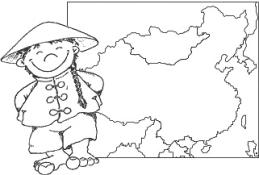Introduction
The preterite (el pretérito indefinido de indicativo) is a Spanish past tense. We use it for completed past actions, facts or general truths in the past or to express an action that interrupts a second action.
Learn to conjugate -ar, -er, -ir verbs in the preterite indicative tense. Master the grammar rules and get tips on when to use this tense then put your knowledge to the test in the exercises. In tense comparison, you will find an overview of all the tenses in Spanish grammar.
Example

El año pasado llegó una chica nueva a clase. Era china, de Pekín. Con un mapa nos explicó todo sobre su país y su ciudad.
Me encantó conocerla, pero justo cuando empezábamos a ser amigos de verdad tuvo que marcharse. Fue una verdadera lástima. Me quedé muy triste.
When to use the preterite tense in Spanish grammar
The preterite tense in the indicative mood works similarly to the simple past tense in English. We use the preterite to express:
- completed actions and events that took place in the past
- Example:
- El año pasado llegó una chica nueva a clase.
- Con un mapa, nos explicó todo sobre su país y su ciudad.
- Me encantó conocerla, …
- Fue una verdadera lástima.
- Me quedé muy triste.
- an action that interrupts another action that was already in progress; the background action is expressed in the imperfect tense
- Example:
- Justo cuando empezábamos a ser amigos de verdad tuvo que marcharse.
Preterite or imperfect?
There is more than one past tense in Spanish grammar. Many Spanish learners have difficulty understanding the difference between imperfect indicative and preterite indicative.
Learn how and when to use each tense with the tense comparison: imperfect or preterite.
How to conjugate the preterite tense in Spanish
To conjugate verbs in the preterite tense (pretérito indefinido), we replace the infinitive endings -ar, -er, -ir verb endings with the following endings. Note that the endings for -er and -ir verbs are the same:
| Person | -ar | -er/-ir | |||
|---|---|---|---|---|---|
| Endings | hablar | Endings | aprender | -ir vivir |
|
| yo | -é | hablé | -í | aprendí | viví |
| tú | -aste | hablaste | -iste | aprendiste | viviste |
| el/ella/usted | -ó | habló | -iò | aprendió | vivió |
| nosotros/-as | -amos | hablamos | -imos | aprendimos | vivimos |
| vosotros/-as | -asteis | hablasteis | -isteis | aprendisteis | vivisteis |
| ellos/-as/ustedes | -aron | hablaron | -ieron | aprendieron | vivieron |
Reflexive Verbs
When we use a reflexive verb in the preterite tense, the reflexive pronoun (me, te, se, nos, os, se) always comes before the verb.
- Example:
- (yo) me mudé
- (tú) te mudaste
- (él) se mudó
- (nosotros) nos mudamos
- (vosotros) os mudasteis
- (ellos) se mudaron
Irregular Conjugations
Some verbs have irregular conjugations in the preterite tense.
- There are some verbs that change their stem and take the preterite endings: -e, -íste, -o, -imos, -ísteis, -ieron/-eron.
| Infinitive | Irregular Stem | Preterite Conjugation (yo, tú, él, nosotros, vosotros, ellos) |
|---|---|---|
| andar | anduv- | anduve, anduviste, anduvo, anduvimos, anduvisteis, anduvieron |
| caber | cup- | cupe, cupiste, cupo, cupimos, cupisteis, cupieron |
| dar | d- | di, diste, dio, dimos, disteis, dieron |
| decir | dij- | dije, dijiste, dijo, dijimos, dijisteis, dijeron |
| estar | estuv- | estuve, estuviste, estuvo, estuvimos, estuvisteis, estuvieron |
| haber | hub- | hube, hubiste, hubo, hubimos, hubisteis, hubieron |
| hacer | hic-/hiz- | hice, hiciste, hizo, hicimos, hicisteis, hicieron |
| poder | pud- | pude, pudiste, pudo, pudimos, pudisteis, pudieron |
| poner | pus- | puse, pusiste, puso, pusimos, pusisteis, pusieron |
| querer | quis- | quise, quisiste, quiso, quisimos, quisisteis, quisieron |
| saber | sup- | supe, supiste, supo, supimos, supisteis, supieron |
| tener | tuv- | tuve, tuviste, tuvo, tuvimos, tuvisteis, tuvieron |
| traer | traj- | traje, trajiste, trajo, trajimos, trajisteis, trajeron |
| venir | vin- | vine, viniste, vino, vinimos, vinisteis, vinieron |
| ver | v- | vi, viste, vio, vimos, visteis, vieron |
- The verbs ser and ir are identical in the preterite tense. We know from the context which verb is meant.
| Person | ser | ir |
|---|---|---|
| yo | fui | fui |
| tú | fuiste | fuiste |
| él | fue | fue |
| nosotros/-as | fuimos | fuimos |
| vosotros/-as | fuisteis | fuisteis |
| ellos/-as | fueron | fueron |
- Some –ir verbs, change their stem in the 3rd person singular and plural (-e → -i, -o → -u).
- Example:
- pedir – pedí, pediste, pidió, pedimos, pedisteis, pidieron
- dormir – dormí, dormiste, durmió, dormimos, dormisteis, durmieron
- Verbs that end in –ucir, change –uc to -uj. The endings of these verbs are irregular (-e, -iste, -o, -imos, -isteis, -eron).
- Example:
- traducir – traduje, tradujiste, tradujo, tradujimos, tradujisteis, tradujeron
- For verbs ending in a vowel + -er/-ir, we change –i to a –y in the 3rd person singular and plural form.
- Example:
- caer – caí, caíste, cayó, caímos, caísteis, cayeron
- distribuir – distribuí, distribuiste, distribuyó, distribuimos, distribuisteis, distribuyeron
- leer – leí, leíste, leyó, leímos, leísteis, leyeron
- oír – oí, oíste, oyó, oímos, oísteis, oyeron
- Sometimes, we have to change the final consonant of certain -ar verbs in the 1st person singular in order to preserve the pronunciation.
- Example:
- c becomes qu → atracar – atraqué
- g becomes gu → colgar – colgué
- gu becomes gü → averiguar – averigüé
- z becomes c → empezar – empecé
- For verbs ending in –ll/-ñ + -er/-ir, we remove the final –i in the 3rd person singular and plural.
- Example:
- tañer – tañó/tañeron (not:
tañió/tañieron) - bullir – bulló/bulleron (not:
bullió/bullieron)
https://espanol.lingolia.com/en/grammar/tenses/preterito-indefinido
